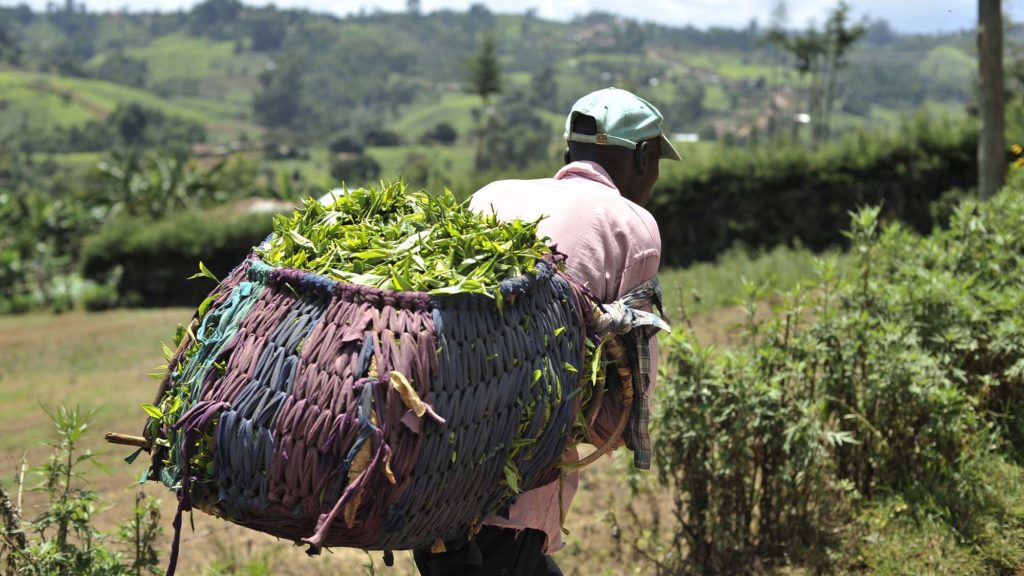Iriaini was Fairtrade certified in October 2006. It currently sells around 60 tonnes of tea or 2% of production to the Fairtrade market.
About Iriaini Tea Factory
Kenya is the world’s third largest tea producer and its largest exporter, shipping a record 412,000 tonnes of tea in 2010.
Tea estate companies produce around 40% of Kenya’s teas, the balance being grown by more than 560,000 smallholders who are shareholders in 63 independent tea factories. The factories, including Iriaini, are under the overall management of the Kenya Tea Development Agency (KTDA), which also provides technical and marketing services. KTDA is the privatised successor to a state-run enterprise set up in the 1960s to build and operate tea factories as part of a scheme to develop the smallholder tea sector and increase rural incomes.
Iriaini Tea Factory was commissioned in 1981 with 2,000 shareholders. This has now increased to 7,137 smallholder tea farmers who supply green leaf to the factory. Iriaini is located in the Nyeri District of Central Province, 50km north of Nairobi. The volcanic soil there supports tea, coffee and dairy farming along with food crops such as maize, beans and vegetables.
We benefit from the knowledge Fairtrade brings. It introduced us to the wider world. Fairtrade has given us that extra push.
Githinji Hutchinson, Iriaini Board Chairman
Production and sales
Members of Iriaini farm 0.5 hectares on average and produced a total of 12.6 million kilos of green leaf in 2012. Members deliver their freshly plucked green leaf to local buying centres where it is weighed and then transported to the factory. Here it is processed into black tea using the CTC method and sold through Mombasa auction or by direct sales to exporters and local markets. Production totalled 3.2 million kilos in 2012.
Fairtrade
Iriaini currently sells around 60 tonnes of tea or 2% of production to the Fairtrade market. Iriaini receives the Fairtrade Minimum Price, or market price if higher, for these sales plus the Fairtrade Premium of $0.50 a kilo to invest in business development or community improvements.
Climate change is a reality for tea farmers in Kenya, causing an increase in pests and disease and reducing both tea yields and quality. Fairtrade encourages good agricultural practices and environmental protection to help farmers ensure their businesses are sustainable and provides additional income to invest in diversification to reduce overdependence on tea. Iriaini reports that it is in capacity building and training – especially on project development and management – that Fairtrade has created the most impact.
Fairtrade Premium projects
Business development
In a Fairtrade-supported partnership with Marks & Spencer, Iriaini is increasing earnings by exporting packaged tea directly to UK supermarket shelves. Packed at its new facility, part-funded by the Fairtrade Premium, Iriaini is capturing 60% more value at source as well as boosting speciality Kenyan tea consumption in the UK.
Environment
Iriaini’s tea factory has been heavily dependent on wood as a fuel source for the tea drying process, needing an annual supply equating to 20,000 to 25,000 trees or 20 to 25 acres. As it takes eight to ten years for newly planted trees to be ready for fuel production, the situation was becoming unsustainable and Iriaini decided to look for an alternative. Iriaini found part of the solution in the use of biomass, a renewable energy source which consists of organic matter like leaves, sawdust, maize combs, coffee husks and twigs and branches. A machine compresses the materials into briquettes, which are then ready for use. Not only is biomass made of materials which are often discarded and can even have a negative influence on the environment, the energy source is also much more energy efficient due to its lower moisture content (only 10% against 20%-25% for wood).
The project is also being implemented at the domestic level, investing the premium in purchasing biomass stoves and training farmers in how to use them at home. The new domestic stoves are three times more energy efficient, allowing families to save on their energy bills, while enjoying a cleaner, healthier environment at home.
Diversification
The premium has been invested in training farmers to keep bees for honey and purchasing 400 beehives. This has been a real success – creating a local cottage industry, providing extra employment opportunities for young people and making a real contribution to poverty reduction.
Capacity building training has also been used to establish passion fruit production (for sale to a local pulping factory which exports the juice to UK buyers), tomato and sunflower cultivation, a fish pond, poultry farming, and a rabbit breeding programme for meat production – as a source of extra income and to improve family nutrition.
Micro-finance
A small loans scheme provides credit to members who otherwise have difficulty obtaining bank loans.
Infrastructure
A new buying centre has been built, dramatically reducing the time farmers spend delivering their crop. Fourteen buying centres have been renovated: this includes electrification, painting, repairs, new roofing, installation of steel security doors and gates and installation of toilet facilities.
Education
The Premium has been invested in upgrading the facilities of a local secondary school. This investment means that many children who had to drop out after primary school now have the prospects of a brighter future.
Toilet facilities at Iriaini primary school have been upgraded. Previously just five toilets were available for 200 pupils and class time was reduced as the children had to wait in long lines to use them. New, improved toilets funded with Fairtrade Premiums have rectified that situation.
